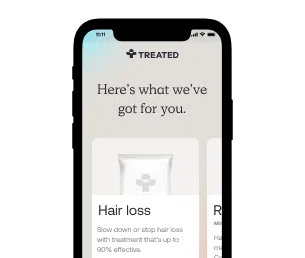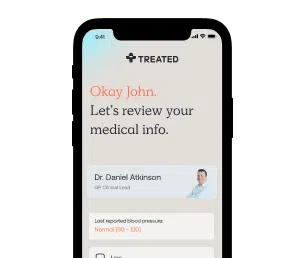Hypothyroidism
Tablet treatments to improve your underactive thyroid.
Secure delivery
UK clinicians
Hypothyroidism is a condition in which the thyroid gland doesn’t produce as many hormones as it should. It causes unpleasant feelings like lethargy, depression and weight gain.
If you’ve got any of the symptoms of Hypothyroidism, we’ll give you friendly help and advice. Order Hypothyroidism treatment online.
Hypothyroidism is sometimes known as an underactive thyroid. If you’re diagnosed with either, it’s helpful to know that they’re both the same condition but with a slightly different name.
Hypothyroidism and underactive thyroid mean that the thyroid gland can’t produce enough of a hormone called thyroxine. Thyroxine is the hormone that controls how much energy your body uses and is responsible for balancing your metabolism.
Think about it in terms of the battery on your smartphone. You may suddenly notice that even though you’re still using it for the same amount of time every day, the battery runs out quickly and needs more frequent charging to keep it going. If your body doesn’t have enough thyroxine, a similar type of thing happens and over time it can cause a range of unpleasant symptoms such as depression, fatigue, muscle cramping and weight gain.
It’s a condition that affects both men and women, though it’s more common in women. One reason for this is because hypothyroidism is known to be an auto-immune condition and these tend to be more prevalent in females than in males.
Hypothyroidism is usually most common in people aged over 60, but can occur at any age or stage of life.
In fact, children can develop it too, and it can be present from birth. It’s possible to be born with an underdeveloped thyroid, which will need to be corrected with treatment. This will usually be taken for life.
Hypothyroidism is actually a relatively common condition globally. There are very few countries across the world that don’t have any cases at all. Across all genders, it’s estimated that between 1-5% of the population globally has some level of hypothyroidism.
In some countries, cases are caused by diets that don’t contain enough iodine, which is found in foods such as seafood. Similarly, it can also occur when you don’t get enough dairy products in your diet too.
However, there are also other factors that increase susceptibility to hypothyroidism, such as genetic predisposition, your ethnicity and even social factors such as whether or not you smoke.

How we source info.
When we present you with stats, data, opinion or a consensus, we’ll tell you where this came from. And we’ll only present data as clinically reliable if it’s come from a reputable source, such as a state or government-funded health body, a peer-reviewed medical journal, or a recognised analytics or data body. Read more in our editorial policy.
There are a range of reasons why someone might have hypothyroidism. It can be caused by many different factors.
You may be genetically predisposed to an underactive thyroid if one or more close blood relatives has it. It’s always worth talking to your family to see if there are any diagnosed cases that you might not have been aware of.
It can be caused by your thyroid gland being attacked by your immune system (otherwise known as an auto-immune disease). Auto-immune conditions are defined as illnesses in which the body’s cells attack each other. They can end up causing problems with other organs in the body. Conditions such as coeliac disease, lupus and type 1 diabetes are all examples of auto-immune illnesses.
There is also a condition called Hashimoto’s disease, which is classed as another auto-immune illness, which causes some of the same symptoms of an underactive thyroid. This can lead to later development of hypothyroidism.
When your thyroid gland is attacked in this way, it produces less of the hormone thyroxine. This is the hormone you need to keep your metabolism in check as it converts fat into energy. Your diet plays an important role in keeping your thyroid gland functioning, lack of iodine from foods such as fresh fish, seafood and dairy products like cheese and milk can affect it too.
In some very rare cases, it’s possible to be born without a properly developed thyroid gland, which can cause an underactive thyroid to develop. In these cases, it’s important to detect it as soon as possible and start treatment. This will usually be for life.
If your body doesn’t produce enough thyroxine, you might feel as if you’re going in slow motion, as your body has to conserve all the energy it needs in order to carry on day to day.
Therefore, you might notice symptoms such as:
Many people who have hypothyroidism are diagnosed, start treatment and begin to feel better over time. It’s often a gradual recovery, but a noticeable one.
In some people who have the condition but perhaps don’t know they have it or have left it untreated, complications can occur. These include:
If you have an underactive thyroid, our clinicians can help. We'll talk through treatment options with you and recommend the right medications for you.

How we source info.
When we present you with stats, data, opinion or a consensus, we’ll tell you where this came from. And we’ll only present data as clinically reliable if it’s come from a reputable source, such as a state or government-funded health body, a peer-reviewed medical journal, or a recognised analytics or data body. Read more in our editorial policy.

How we source info.
When we present you with stats, data, opinion or a consensus, we’ll tell you where this came from. And we’ll only present data as clinically reliable if it’s come from a reputable source, such as a state or government-funded health body, a peer-reviewed medical journal, or a recognised analytics or data body. Read more in our editorial policy.
Have something specific you want to know? Search our info below, or ask our experts a question if you can’t find what you’re looking for.
Hypothyroidism (Underactive Thyroid) | NIDDK. [Accessed 28-09-21]
Global epidemiology of hyperthyroidism and hypothyroidism. Nature Reviews Endocrinology, 14(5), pp.301–316. [Accessed 28-09-21]
Hypothyroidism - Symptoms and causes. Mayo Clinic. [Accessed 28-09-21]
Diagnosis - Underactive thyroid (hypothyroidism). NHS. [Accessed 28-09-21]

Generic version of Eltroxin. Treats symptoms of an underactive thyroid, giving you more energy.

Registered with GMC (No. 4624794)
Meet Daniel
Registered with GPhC (No. 2202465)
Meet Sanjeda
Registered with GPhC (No. 2070724)
Meet Craig
Always read the leaflet that comes with your medication and tell us about any side effects you get.
We know health, but you know you.
Our experts tell you what’s safe, but you decide what’s best.
Answer a few questions and tell us about yourself. Get tailored advice from our clinicians so you can choose better.

Choose your treatment and how often you have it delivered.

We know things change. It’s the nature of life. We’ll check in regularly to make sure your treatment is still right for you.
Pause. Change. Skip. Start again. Any time you like.
Here are some other things we can help with.
Choose from our range of tablets and solutions. Get ongoing care and support from our experts.
Stop smoking treatments that can help you kick the habit forever, and reduce your risk of disease.
Tablets or injections. Tailored weight loss treatments combined with ongoing support from our experts.
We're making healthcare more about you. Sign up to our newsletter for personalised health articles that make a difference.
Disclaimer: The information provided on this page is not a substitute for professional medical advice, diagnosis, or treatment. If you have any questions or concerns about your health, please talk to a doctor.
We couldn't find what you're looking for.
Here's everything we treat. Or, if you're looking for something we don't have yet, you can suggest something.
If there’s a particular treatment or condition you’re looking for, tell us and we’ll look into it for you.
Submit your question here, or tell us if you’ve found an issue on our site.
We’ll get back to you very soon. We aim to respond to all queries in one working day.
You’re signed up to our newsletter. Keep an eye on your inbox for our latest update.
By clicking 'Subscribe now' you're agreeing to our Privacy Policy.
We’ve sent you an email asking you to confirm your email address.